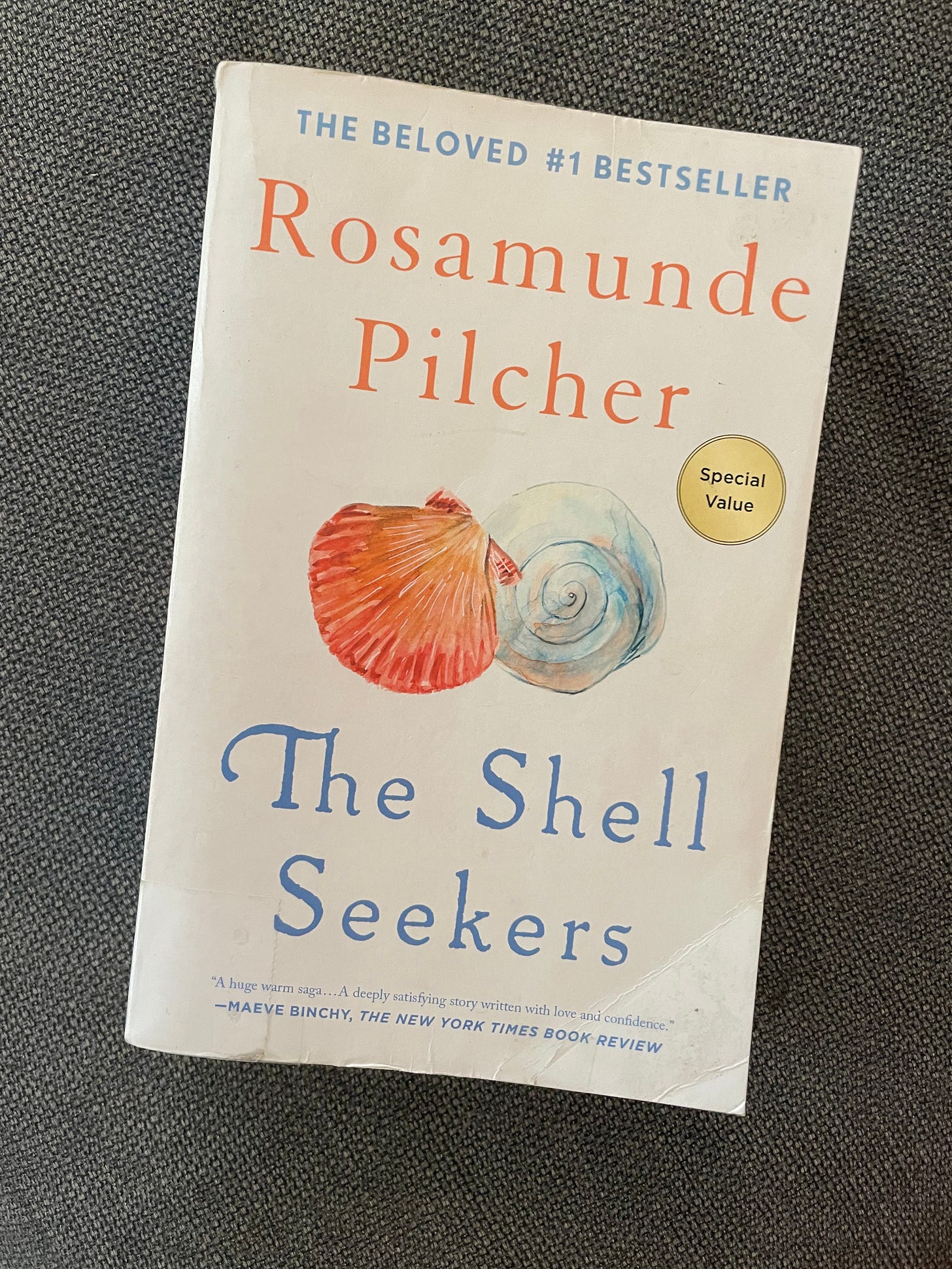Take this '80s bestseller home for the holidays
The Shell Seekers is a 500-page breath of brisk British air—and relevant! Plus a soup recipe.
Friends,
Could you use a tome that’s heavy only in the physical sense (like 500 pages), but as brisk as a blast of sunny salt air to get you through the end of this year?
How about a strong female protagonist of the sort who won’t take shit from anyone, including her own children, but consistently offers guests a cup of tea (or a G&T) upon arrival? A smidge of English country-cottage lifestyle porn? A pre-internet era? Life continuing on with tenderness, generosity, good taste, and humor despite fascism, heartbreak, and shitty weather? A stint in Ibiza?
Then have I got a book for you: The Shell Seekers by Rosamunde Pilcher. It was first published in 1987 and became a runaway hit, unseating The Bourne Ultimatum from the top of the best-seller list and inspiring two TV adaptations more than a decade apart. (I’ve yet to watch either.) Pilcher, who was British, had been writing what she called “frightfully wet little novels—romantic stuff with red roses on the cover” for decades when her publisher, Tom Dunne of St. Martin’s Press, visited her family in Scotland in 1984.
As Pilcher tells it in the introduction of the 2015 edition, her family was giving Dunne a hard time for not making their mother suitably rich and famous, when Dunne said just what she’d need to do to get there: write “a big fat novel for women. A good read. Something to get the teeth into. And something, above all, that tapped into my life and the experiences of my generation.”
Pilcher was 60 at the time and had never spent more than three months writing a novel (!). “I quailed slightly,” she wrote.1 “But what Tom had said was a challenge. And if a person you respect thinks you can do something, then you usually can.” Go Rosamunde, go!
She began braiding a story to integrate what she recognized as three important themes: the lives of bougie British bohemians, the “disastrous effect” that the prospect of inheritance and riches can have on otherwise nice families (this is a much gentler treatment of that idea than we got in Long Island Confidential), and Great Britain in the days before World War II: “those years when Britain, rich and powerful, basked in a social climate that we imagined was high noon—but was, in fact, twilight, the sun sinking as the nation faced, with some resolution, the frightening might of Hitler’s Third Reich.” Eep.
This may make The Shell Seekers seem tough to take on. But trust me when I tell you that protagonist Penelope Keeling’s kitchen would be a perfect place to spend the holidays. I found myself comforted by the book’s extensive length because for a long time, I was in no danger of finishing it any time soon. Also nice: it’s probably available at your local library. My mom happened to be with me when I picked it up from mine. She was surprised to see its familiar cover, and told me that it had been one of my grandmother’s favorite books toward the end of her life. Which is just the sort of thing that would happen in The Shell Seekers.
Have a good day!
Jenni
P.S.
If you’re not on the road for Thanksgiving and need a pot of something satisfying and healthy to get you through the first half of next week, may I suggest Dorie Greenspan’s orange-scented lentil soup? It requires zero obnoxious ingredients and with a simple salad and crusty bread is just the sort of meal that Penelope Keeling might serve you on a November afternoon. You can find the recipe here, and also in Around My French Table, an MVP of my cookbook shelf.
P.P.S.
I’m realizing that The Shell Seekers came recommended by my friend Dana who is also the person who brought us Survival Muffins and the green spaghetti. If this keeps up I may have to do a spinoff of sorts … “Dana Suggests?” “My Friend Dana?” Anyway, thank you Dana.
I dare you to use “quail” as a verb in a sentence this weekend.





Cannot wait to read this! Thanks for the fabulous reco!